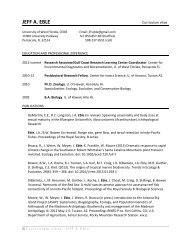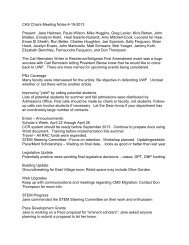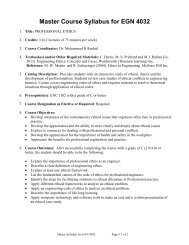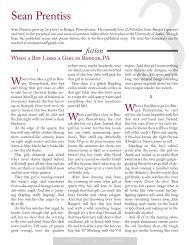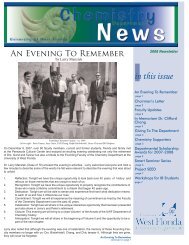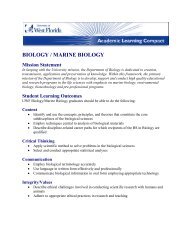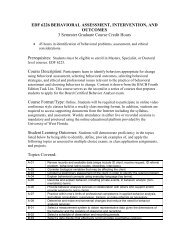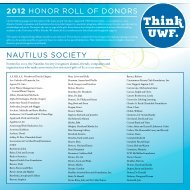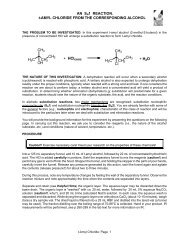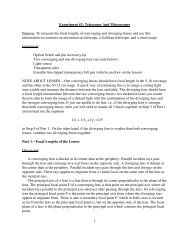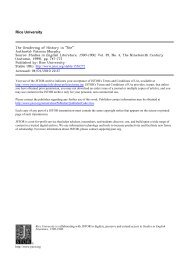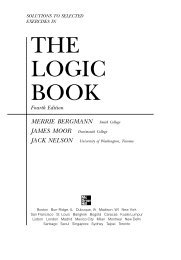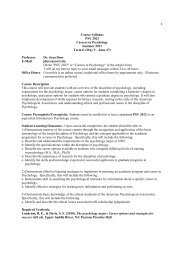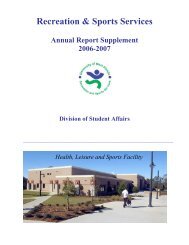ANT 2000 Introduction to Anthropology - University of West Florida
ANT 2000 Introduction to Anthropology - University of West Florida
ANT 2000 Introduction to Anthropology - University of West Florida
You also want an ePaper? Increase the reach of your titles
YUMPU automatically turns print PDFs into web optimized ePapers that Google loves.
<strong>ANT</strong> <strong>2000</strong><br />
<strong>Introduction</strong> <strong>to</strong> <strong>Anthropology</strong><br />
SYLLABUS AND COURSE INFORMATION<br />
Spring 2014<br />
Pr<strong>of</strong>essor: Dr. John Worth (jworth@uwf.edu)<br />
Teaching Assistant: Michelle Pigott (mmp23@students.uwf.edu)<br />
Office Hours: Tuesdays & Thursdays, 4-5 p.m., or by appointment<br />
Bldg. 13, Rm. 117, 857-6204<br />
Textbook:<br />
Kottack, Conrad<br />
2013 <strong>Anthropology</strong>: Appreciating Human Diversity (15th edition).<br />
(ISBN: 978-0078035012)<br />
Course Description: <strong>Introduction</strong> <strong>to</strong> subdivision <strong>of</strong> anthropology and anthropological thought,<br />
basic treatment <strong>of</strong> human evolution, origins <strong>of</strong> civilization, world archaeology and modern work<br />
cultures, stressing the continuities <strong>of</strong> human nature.<br />
Course-Specific Student Learning Outcomes:<br />
1. Define and explain anthropology as a discipline which seeks <strong>to</strong> explain similarities and<br />
differences among humans in time and space using holistic and comparative analysis.<br />
2. Identify and describe the four subfields <strong>of</strong> Americanist anthropology, including cultural<br />
anthropology, archaeology, biological anthropology, and linguistics.<br />
3. Define and explain the attributes and importance <strong>of</strong> human culture.<br />
4. Describe the biological basis <strong>of</strong> evolutionary theory as it relates <strong>to</strong> human variation and<br />
adaptation.<br />
5. Identify the relationship between humans and other primates, and describe the evidence<br />
for the evolutionary sequence leading <strong>to</strong> modern humans.<br />
6. Describe and explain the importance <strong>of</strong> major steps in the cultural evolution <strong>of</strong> humans,<br />
including the emergence <strong>of</strong> food production and political complexity.<br />
7. Describe and explain the anthropological perspective on human language and<br />
communication, ethnicity and race, subsistence and trade, political systems, gender,<br />
social organization, religion, and art.<br />
8. Identify and describe the his<strong>to</strong>rical relationship between colonialism and globalization,<br />
and the continuing impact <strong>of</strong> these issues on the modern world.<br />
General Studies Learning Outcomes:<br />
<strong>Introduction</strong> <strong>to</strong> <strong>Anthropology</strong> is designated as a General Studies course. The General Studies<br />
curriculum at the <strong>University</strong> <strong>of</strong> <strong>West</strong> <strong>Florida</strong> is designed <strong>to</strong> provide a cohesive program <strong>of</strong> study<br />
that promotes the development <strong>of</strong> a broadly educated person and provides the knowledge and<br />
skills needed <strong>to</strong> succeed in university studies. This course has been approved as meeting the<br />
requirement in the Behavioral area. The General Studies learning outcomes for this course are<br />
Ethical Reasoning and Info Literacy.<br />
<strong>ANT</strong> 4115, Worth, p. 1 <strong>of</strong> 6 Version 1/3/14
If you are interested in a career in anthropology you should contact the Department <strong>of</strong><br />
<strong>Anthropology</strong> at (850) 474-2797. If you are undecided about your career field you should<br />
contact Career Services at (850) 474-2254 and/or your academic advisor.<br />
Specific Class Requirements:<br />
1. Textbook Readings: The primary means <strong>of</strong> class instruction will be through lectures on<br />
concepts and highlights presented in the textbook. Students must read the assigned chapters<br />
before the class dates indicated on the schedule below, in order <strong>to</strong> be prepared for class each day<br />
(and for any pop quizzes based on these readings). For purposes <strong>of</strong> exams, students are<br />
responsible for the contents <strong>of</strong> both the class lectures and the textbook.<br />
2. Pop Quizzes: There will be a <strong>to</strong>tal <strong>of</strong> six pop quizzes given during the semester, based on the<br />
readings assigned for that day. Quizzes will take place on unannounced class dates at the<br />
beginning <strong>of</strong> class (the first 10 minutes). Only the five highest quiz grades will be counted at 20<br />
points each, for a <strong>to</strong>tal <strong>of</strong> 100 points.<br />
3. Ethical Dilemma Discussions/Annotated Bibliographies: Twice during the semester, there<br />
will be classroom discussions on a specific ethical dilemma related <strong>to</strong> anthropology. Each<br />
student is responsible for conducting his or her own research in order <strong>to</strong> prepare for the<br />
discussion, resulting in an annotated bibliography containing a specific number <strong>of</strong> scholarly<br />
sources in several predetermined <strong>to</strong>pical areas related <strong>to</strong> the dilemma. Each bibliography must<br />
be prepared in the American Anthropological Association (AAA) style guide format<br />
(http://www.aaanet.org/publications/guidelines.cfm), and must be turned in during class on the<br />
day <strong>of</strong> the discussion, counting for up <strong>to</strong> 50 points. Make sure <strong>to</strong> follow relevant guidelines as<br />
indicated in the attached General Class Policies, as supplemented by my Writing Tips for Class<br />
Papers and Quick Anthropological Style Guide Comparison online (links below).<br />
4. Exams: There will be two exams during the term: a mid-term exam and a final exam, each<br />
worth 100 points. These exams will both be comprehensive up <strong>to</strong> the point they are given, and<br />
students should expect <strong>to</strong> make use <strong>of</strong> content from all previous class lectures, and from all<br />
readings (including content that may not have been covered in class).<br />
Extra Credit Opportunities: Several opportunities may be available for students <strong>to</strong> earn extra<br />
points, up <strong>to</strong> a semester maximum <strong>of</strong> 20 points (5% <strong>of</strong> the final grade):<br />
Attend pre-approved archeology lectures: There will be several opportunities <strong>to</strong> attend<br />
outside lectures (such as the monthly Pensacola Archaeological Society meetings, usually<br />
held on the second Tuesday <strong>of</strong> each month at 7:00 pm at the Main Library down<strong>to</strong>wn), or<br />
special conferences, and they will be announced in class. An attendance sheet will be<br />
available at each lecture and 4 points will be awarded for attendance.<br />
Voluntary assistance on archeology projects in the lab and field may be available. The<br />
opportunities will be announced ahead <strong>of</strong> time, and student volunteers will have <strong>to</strong><br />
commit time blocks at a prearranged place and time (minimum 4 hours <strong>of</strong> work = 4<br />
points). Students will be selected on a first-come first-serve basis. Sign-up sheets for<br />
these projects will be made available in class. No-shows will have 4 points deducted<br />
from their grade. Same day cancellations are considered no-shows.<br />
<strong>ANT</strong> 4115, Worth, p. 2 <strong>of</strong> 6 Version 1/3/14
Additional Important Reading: Students must read in detail both the attached “General Class<br />
Policies” document, and also my online “Writing Tips for Class Papers” and “Quick<br />
Anthropological Style Guide Comparison” documents, based on the most common errors I have<br />
seen in student papers. Both <strong>of</strong> these documents are online at the following URL:<br />
http://www.uwf.edu/jworth/teaching.htm. If you have any questions regarding any <strong>of</strong> these<br />
policies, please let me know.<br />
Helpful Student Links: A number <strong>of</strong> useful links may be found at the following page on my<br />
faculty website: http://www.uwf.edu/jworth/links.htm#Students<br />
Grade Determination:<br />
Pop Quizzes (5 <strong>of</strong> 6)<br />
Annotated Bibliographies (2 @ 50 pts.)<br />
Mid-Term Exam<br />
Final Exam<br />
Total<br />
100 points<br />
100 points<br />
100 points<br />
100 points<br />
400 points<br />
Letter grades will be determined by where the <strong>to</strong>tal number <strong>of</strong> points falls in<strong>to</strong> the following<br />
divisions; plus and minus letter grades will also be assigned.<br />
A = 90-100% (360-400 points) C = 70-79% (280-319 points)<br />
B = 80- 89% (320-359 points) D = 60-69% (240-279 points)<br />
<strong>ANT</strong> 4115, Worth, p. 3 <strong>of</strong> 6 Version 1/3/14
SCHEDULE OF LECTURE TOPICS AND ASSIGNED READINGS<br />
Class Location: Building 36, Room 108<br />
Class Times: Tuesdays and Thursdays, 11:00 am-12:15 pm<br />
Please note that this syllabus may be subject <strong>to</strong> change;<br />
any alterations will be announced in class and distributed electronically.<br />
______________________________________________________________________________<br />
Week 1<br />
January 7 <strong>Introduction</strong> and Syllabus Review<br />
January 9 What is <strong>Anthropology</strong>?<br />
Readings: Text: Ch. 1<br />
______________________________________________________________________________<br />
Week 2<br />
January 14 Culture<br />
Readings: Text: Ch. 2<br />
January 16 Applying <strong>Anthropology</strong><br />
Readings: Text: Ch. 3<br />
______________________________________________________________________________<br />
Week 3<br />
January 21 Studying the Past<br />
Readings: Text: Ch. 4<br />
January 23 Evolution and Genetics<br />
Readings: Text: Ch. 5<br />
______________________________________________________________________________<br />
Week 4<br />
January 28 Human Variation and Adaptation<br />
Readings: Text: Ch. 6<br />
January 30 The Primates<br />
Readings: Text: Ch. 7<br />
______________________________________________________________________________<br />
Week 5<br />
February 4 Early Hominins<br />
Readings: Text: Ch. 8<br />
February 6 Archaic Homo<br />
Readings: Text: Ch. 9<br />
______________________________________________________________________________<br />
Week 6<br />
February 11 The Origin and Spread <strong>of</strong> Modern Humans<br />
Readings: Text: Ch. 10<br />
<strong>ANT</strong> 4115, Worth, p. 4 <strong>of</strong> 6 Version 1/3/14
February 13 Ethical Dilemma Discussion #1: ANNOTATED BIBLIOGRAPHY DUE<br />
______________________________________________________________________________<br />
Week 7<br />
February 18 The First Farmers<br />
Readings: Text: Ch. 11<br />
February 20 The First Cities and States<br />
Readings: Text: Ch. 12<br />
______________________________________________________________________________<br />
Week 8<br />
February 25 Midterm Exam Review<br />
February 27 MIDTERM EXAM<br />
______________________________________________________________________________<br />
Week 9<br />
March 4 Method and Theory in Cultural <strong>Anthropology</strong><br />
Readings: Text: Ch. 13<br />
March 6 Language and Communication<br />
Readings: Text: Ch. 14<br />
______________________________________________________________________________<br />
Week 10 – No Class (UWF Spring Break)<br />
______________________________________________________________________________<br />
Week 11<br />
March 18 Ethnicity and Race<br />
Readings: Text: Ch. 15<br />
March 20 Making a Living<br />
Readings: Text: Ch. 16<br />
______________________________________________________________________________<br />
Week 12<br />
March 25 Political Systems<br />
Readings: Text: Ch. 17<br />
March 27 Gender<br />
Readings: Text: Ch. 18<br />
______________________________________________________________________________<br />
Week 13<br />
April 1 Families, Kinship, and Descent<br />
Readings: Text: Ch. 19<br />
April 3 Marriage<br />
Readings: Text: Ch. 20<br />
______________________________________________________________________________<br />
Week 14<br />
April 8 Religion<br />
<strong>ANT</strong> 4115, Worth, p. 5 <strong>of</strong> 6 Version 1/3/14
Readings: Text: Ch. 21<br />
April 10 Arts, Media, and Sports<br />
Readings: Text: Ch. 22<br />
______________________________________________________________________________<br />
Week 15<br />
April 15 Ethical Dilemma Discussion #2: ANNOTATED BIBLIOGRAPHY DUE<br />
April 17 The World System and Colonialism<br />
Readings: Text: Ch. 23<br />
______________________________________________________________________________<br />
Week 16<br />
April 22 Global Issues Today<br />
Readings: Text: Ch. 24<br />
April 24 Final Exam Review<br />
______________________________________________________________________________<br />
FINAL EXAM: Tuesday, April 29, 11:00 am - 1:30 pm, Bldg. 36, Rm. 108<br />
<strong>ANT</strong> 4115, Worth, p. 6 <strong>of</strong> 6 Version 1/3/14
General Class Policies<br />
Dr. John Worth, Department <strong>of</strong> <strong>Anthropology</strong>, <strong>University</strong> <strong>of</strong> <strong>West</strong> <strong>Florida</strong><br />
1. Attendance, Tardiness: Students are required <strong>to</strong> attend class, and roll will be taken at the start <strong>of</strong><br />
class. If you arrive late (after the attendance roll is passed around), it is your responsibility <strong>to</strong> make<br />
sure your attendance is noted in the class roll for that day. Two unexcused absences are permitted<br />
without penalty for classes that meet two or more times a week; only one is permitted for once-a-week<br />
classes. For every additional unexcused absence, one percentage point will be deducted from your<br />
final grade at the end <strong>of</strong> the term. In addition, chronic tardiness <strong>to</strong> class may result in additional<br />
deductions, with four late arrivals equaling one full absence.<br />
2. Excused Absences: If you know in advance you will have <strong>to</strong> miss a class for a legitimate reason<br />
(illness, UWF athletic team participation, military service, etc.), please contact the teaching assistant or<br />
me as soon as possible (or promptly after the fact if an absence is unanticipated). In all cases,<br />
however, excused absences will require appropriate written documentation <strong>to</strong> be provided. One<br />
absence due <strong>to</strong> illness may be excused by email or letter without a supporting doc<strong>to</strong>r’s note, but a<br />
doc<strong>to</strong>r’s note is required for any additional absences due <strong>to</strong> illness during the semester. If no<br />
documentation is provided by semester’s end, the absence will count as unexcused.<br />
3. Classroom Participation: Participation in scheduled classroom discussion sessions is an important<br />
part <strong>of</strong> the learning experience. Failure <strong>to</strong> speak up and participate routinely in these discussions may<br />
result in a lower grade.<br />
4. Readings: Students are expected <strong>to</strong> have read all assigned reading materials before the class on<br />
which they are due. Students are responsible for the content <strong>of</strong> all readings (textbook and otherwise),<br />
as a basis for classroom discussions, quizzes, tests, and exams.<br />
5. Writing Assignments: Writing assignments will be evaluated both for content and for style and<br />
technique. Students are expected <strong>to</strong> use formal language (avoiding colloquial or conversational style)<br />
as well as proper grammar, spelling, and punctuation. For assistance in this regard, writing<br />
assignments may be submitted independently <strong>to</strong> the UWF Writing Lab (http://uwf.edu/writelab/) for<br />
evaluation and assistance prior <strong>to</strong> the due date. Unless indicated otherwise, all writing assignments<br />
should follow the guidelines below:<br />
Use Times New Roman font, 12-point type, double spaced, with 1-inch margins.<br />
Place a header on each page containing page numbers, student last name, and course number.<br />
File names for any electronic submissions <strong>to</strong> the e-Learning dropbox (no email submissions)<br />
should be constructed as follows: lastname-firstinitial-coursenumber-assignment (e.g. Worth-J-<br />
<strong>ANT</strong>4172-ReactionPaper2). Digital files should be submitted only in the following formats: .doc,<br />
.docx, .wpd, .rtf, .pdf (no MS Works or Mac Pages formats).<br />
Submit all printed papers stapled (use paper clips or binder clips only if the paper is <strong>to</strong>o thick <strong>to</strong> be<br />
stapled, usually 20-25+ pages) and without plastic report covers. Title pages are optional, but are<br />
not recommended for short writing assignments, and should generally be reserved for longer term<br />
papers. Abstracts are never needed.<br />
If required for a writing assignment, the bibliography should be placed on a separate page or pages<br />
at the end <strong>of</strong> the paper, and this page will not count <strong>to</strong>ward minimum or maximum page lengths<br />
indicated for any specific writing assignment.<br />
Sources listed in bibliography must be properly cited within the text <strong>of</strong> the paper, including page<br />
numbers except in rare cases where the citation is <strong>to</strong> the entire book or article.<br />
Unless indicated otherwise, bibliographies must be formatted as indicated in an accepted<br />
anthropological style guide; <strong>2000</strong>-level students should use AAA only, while 3000-6000-level<br />
students may use AAA, SAA, or SHA styles (see http://www.uwf.edu/jworth/links.htm#Writing).<br />
Internet sources (not including print journals also posted online, such as at JSTOR) should be kept<br />
Worth Policies, version 12/28/13 Page 1 <strong>of</strong> 2
<strong>to</strong> a minumum, and unrefereed sources such as Wikipedia are always unacceptable for<br />
bibliographies; internet citations should include all appropriate bibliographic information as<br />
indicated in the appropriate style guide, and not simply the URL. Course textbooks and reserve<br />
readings may be cited if appropriate, but will not count <strong>to</strong>ward minimum numbers <strong>of</strong> sources.<br />
Any figures (illustrations, maps, tables, etc.) or tables should not be placed in the main paper text,<br />
but must be inserted after the main paper text and bibliography, and these additional pages with<br />
figures or tables will not count <strong>to</strong>ward minimum or maximum page lengths. If more than one<br />
specific figure or table is referenced directly in the text, they should be numbered accordingly.<br />
6. Assignment Due Dates, Incompletes: All assignments are due by the day and hour indicated on the<br />
syllabus, and it is the student’s responsibility <strong>to</strong> keep track <strong>of</strong> their assignments. If you know that you<br />
will not be present at class <strong>to</strong> deliver an assignment, you must make prior arrangements <strong>to</strong> submit it by<br />
the due date via the online e-Learning dropbox provided for this purpose (no email submissions).<br />
Grades for late assignments will be reduced by one letter grade (10%) per day after the due date and<br />
time (i.e. 6 hours late = 10% reduction, 30 hours late = 20% reduction). Please note that in accordance<br />
with UWF pro<strong>to</strong>cols, I will not consider giving Incomplete (“I”) course grades except in documented<br />
cases <strong>of</strong> extreme or extended personal or family hardship, and never in cases where students simply<br />
fall behind in their work due <strong>to</strong> poor time management or outside work overload.<br />
7. Tests and Quizzes: Unless indicated otherwise, all tests are cumulative up <strong>to</strong> the date <strong>of</strong> the test,<br />
including content drawn from all readings and classroom lectures. All tests and quizzes begin at the<br />
start <strong>of</strong> class, and students who arrive late may completely miss short quizzes (normally 10 minutes in<br />
length), and will not be given additional time for longer tests. In addition, makeup tests or quizzes will<br />
only be <strong>of</strong>fered in cases where students can provide a documented excuse for being late or for not<br />
being able <strong>to</strong> attend class on the day and time <strong>of</strong> the test, and not for previous illness or other reasons<br />
that may have interrupted personal study schedules, or for absences (excused or not) on scheduled test<br />
review sessions. Students are expected <strong>to</strong> keep up with the material throughout the semester, and avoid<br />
last-minute cramming which could be affected by illness or other unexpected reasons.<br />
8. Disability Accommodations: Testing and other accommodations will be made for students with<br />
disabilities, but these accommodations must be requested through the UWF Student Disability<br />
Resource Center, which can be found in Bldg. 19, Rm. 100D, and online at http://uwf.edu/sdrc/.<br />
9. Communication: The best way <strong>to</strong> contact me is by email, and I will do my best <strong>to</strong> respond within<br />
24-48 hours on weekdays, though this may not always be possible. I will also be available in my <strong>of</strong>fice<br />
during posted <strong>of</strong>fice hours, or appointments can be made at other times via email or phone. In all<br />
cases, open communication with me or with the teaching assistant is paramount, especially if you have<br />
any questions or concerns, or if you need <strong>to</strong> report absences. The longer you wait <strong>to</strong> communicate<br />
regarding a problem, the less the chance it can be resolved in a satisfac<strong>to</strong>ry manner.<br />
10. Classroom Conduct: As a courtesy <strong>to</strong> your classmates and instruc<strong>to</strong>r, all cellphones, smartphones,<br />
blackberries, or similar devices must be turned <strong>of</strong>f or placed on silent during class time. Personal<br />
lap<strong>to</strong>p or tablet computers, and e-readers, are permitted in class only if placed on silent mode, and only<br />
for purposes <strong>of</strong> note-taking or consulting readings during class discussions. If observed, inappropriate<br />
computer or other mobile device use during class (gaming, texting, internet surfing) will result in an<br />
unexcused absence for that day.<br />
11. <strong>University</strong> Guidelines: Students should read, understand, and observe the Student Code <strong>of</strong><br />
Conduct and the Academic Misconduct Code for the <strong>University</strong> <strong>of</strong> <strong>West</strong> <strong>Florida</strong>, which may be<br />
accessed online at http://uwf.edu/osrr/, or in the Student Handbook.<br />
12. Online Student Resource Links: My faculty web page includes a list <strong>of</strong> useful links for students<br />
at the following URL: http://www.uwf.edu/jworth/links.htm#Students. In addition, digital copies <strong>of</strong><br />
class syllabi, class policies, writing tips, and other information may be found at:<br />
http://www.uwf.edu/jworth/teaching.htm.<br />
Worth Policies, version 12/28/13 Page 2 <strong>of</strong> 2



